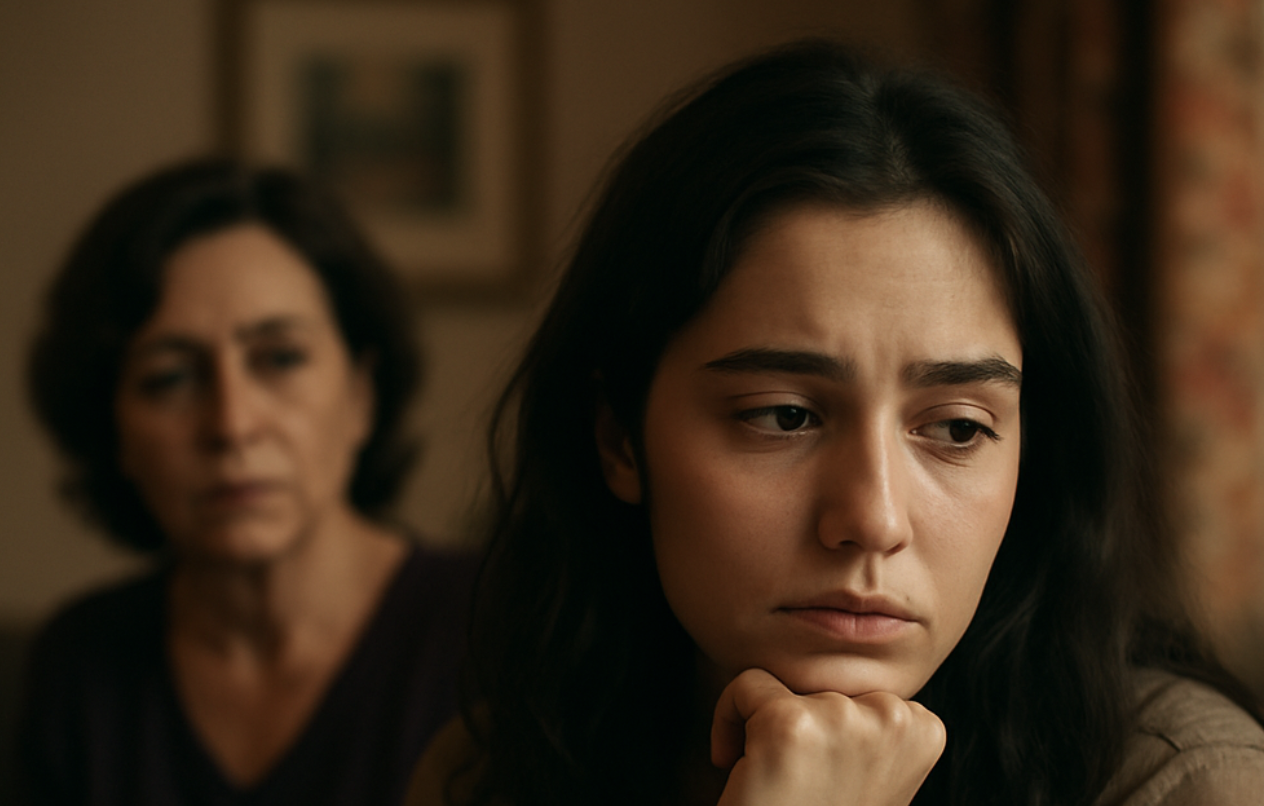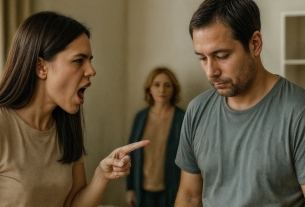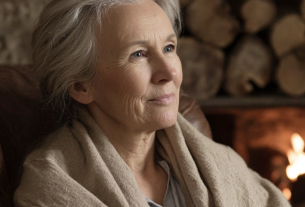Spring in the garden is especially wonderful. The apple trees are in bloom, the birds are singing, and the air is so fresh it takes your breath away. You hear the buzzing of bees, breathe deeply — and realize: living outside the city is a great blessing. Especially when it’s only twenty minutes to the city by car. That’s why the entire Sokolov family works in the city.
Today is Sunday, so in the morning all the household gathered at the table on the terrace: the head of the house Ivan Matveevich Sokolov, his wife Nina Andreevna, their son Philip, and his young wife Alla. Over cups of tea, they were leisurely having breakfast and discussing family matters. Suddenly, a car stopped at the gate, and a voice was heard a couple of minutes later:
“Is anyone home?” — a head in a cap appeared over the gate. From afar, a thick red mustache was noticeable. Seeing it, Ivan Matveevich immediately jumped up:
“It’s Ilyukha, my brother!”
He rushed to the gate, easily jumping over the peony flower beds.
“Hey, Vanya! Open the gate, the relatives have arrived!” — Ilya shouted cheerfully, laughing.
Nina Andreevna also got up from the table and went to meet the guests. The young people stayed on the terrace.
“Phil, maybe we should go out to greet them?” — Alla asked.
“Oh, come on, sunshine,” her husband smirked, “do you think they’ll get offended and leave? You don’t know Uncle Ilya. He doesn’t just show up like that. Trouble is coming, trust me.”
“Trouble? Why do you think so?”
“Because Uncle Ilya is trouble itself on two legs,” Philip laughed.
Alla and Philip had married two months ago but planned to have the wedding in August when Alla’s mother — Zinaida Mikhailovna — could come. She had lived abroad for many years with her husband Frederic and could only visit during vacations. Alla’s parents asked to wait to attend the wedding because Alla was her mother’s only child.
After a while, Philip and Alla saw Ivan Matveevich and Nina Andreevna carrying bags, followed by Ilya and his wife Antonina Arnoldovna carrying suitcases. Everyone was smiling broadly except Nina Andreevna. She was clearly displeased. First, she didn’t like unexpected guests — nowadays one can easily warn by phone. Second, she knew her son-in-law’s character well.
Ilya was a cunning man, always looking for his own benefit and able to trick even the most cautious. His brother Ivan, on the contrary, was simple, good-natured, and ready to help anyone. Ilya had used this all his life.
So Philip was right — Uncle’s visit was definitely not accidental. Ilya had again brought some of his business matters that he wanted to solve with the help of his brother’s family.
“Welcome the guests, nephew!” Ilya shouted, crossing the yard.
“We ourselves are guests here with our parents,” Philip replied, “we’ll be back in the city tomorrow.”
Alla took off her glasses, stretched her legs comfortably, and said thoughtfully:
“Maybe we should stay? I see how busy mom and dad are now. Uncle Ilya and his wife could just wear them out.”
“Seriously?” Philip was surprised.
“I’m sure,” Alla nodded.
Ivan and Ilya grew up in an intellectual family. Their mother worked as a translator, their father was a diplomat. The very house where Ivan now lived belonged to their parents. After their death, the brothers divided the inheritance: the four-room apartment in the center went to the older — Ilya, and the younger, Ivan, got the country house.
Over time, Ivan built a new house, garage, and summer kitchen on the property. He renovated the old house with his own hands, preserving only the apple orchard — a memory of childhood. Everything else was newly built.
The inheritance division could not be called fair: the apartment in the historic center was worth much more than the old wooden house. But Ivan didn’t mind. By then, Ilya already had a family: wife and little daughter Varvara, so he needed it more. And for himself, Ivan was glad to have at least a piece of the past — the house where he grew up. Here, among the trees and river, he felt at home.
After university, when Ivan still didn’t have a car, he had to get up early to get to the institute. Meanwhile, his brother’s apartment was five minutes’ walk from the university. But not once did Ilya offer his brother to stay overnight or at least have lunch. Ivan didn’t ask, but sometimes he was tempted to visit the house where he grew up. Only he didn’t dare come without an invitation.
But every summer, Ilya came to Ivan’s country house:
“Hello, brother! I brought the family. Let the kids breathe fresh air, swim in the river. After all, this is my house too — father built it.”
Ivan always gladly welcomed relatives. He understood that the city meant smog, noise, and no rest. Children needed to run in nature. And when Ivan got married, nothing changed. His daughter-in-law Ninochka, a girl from a neighboring village, turned out to be a hardworking and simple woman. Ivan had known her since childhood — they often met by the river. But Ilya did not approve of his brother’s choice…
“Vanya, you’re a physicist, work at a serious enterprise. People respect you, but you took a wife from the common folk!” — Ilya grimaced like tasting a lemon.
Ivan just shrugged and laughed good-naturedly:
“What does origin have to do with it? We ourselves aren’t nobles. Simple people, just educated. We all come from the people — both our father and grandfather. Not nobles!”
“Well, what now?” — Ilya grumbled. — “You could have found someone from the city, and this one has no pedigree at all.”
Ivan just waved his hand. Of course, Ninochka was not wealthy. She had nothing: no money, no support. Her father left early, her mother died when she was very young, she was raised by her grandmother. From childhood, Nina worked: helped with chores, milked the cow, fetched water. She graduated school with excellent grades but couldn’t continue studies because her grandmother fell ill, and Nina stayed with her.
After many years, Ivan met her again on the riverbank. At first, he didn’t even recognize her — where was the skinny, snub-nosed girl Buynova? Before him stood a beautiful, confident woman. He fell in love at first sight and married her. His brother’s words did not stop him, and he never regretted it. For him, Nina was the best woman in the world.
For thirty years they lived in harmony. They raised their son Philip, built a house, renewed the garden. Even their grandson had grown up. When Philip married Alla, the parents accepted the bride as their own daughter. And Alla repaid them in kind — she loved her new parents and always tried to be close.
Alla is a strong-willed girl, daring, with a straightforward outlook on life. They say about such people: “she’ll find her way and figure it out herself.” But with Ivan and Nina, she is especially gentle, caring, and ready to help anytime. She feels they are real people.
Alla’s father died when she was only eight. Her mother — Zinaida Mikhailovna — cried, cried, then remarried. The second husband was no better — he drank and abused both wife and stepmother. A year later, Zina filed for divorce and left with her daughter to her father — Mikhail Pavlovich.
But for how long? Soon Zina wanted to start a new life again. But grandfather and grandmother didn’t give up their granddaughter. They persuaded Alla to stay in the village and live with them until her mother settled down.
This “arrangement” dragged on. Zina jumped from one man to another like a butterfly until she met Frederic — an Italian doctor working at the same clinic where she was a nurse.
Frederic turned out to be a decent, kind, intelligent man. He loved Zina and treated her daughter and parents well. He wanted to take Alla to Italy and adopt her, but she refused. She couldn’t leave the grandfather who had raised her since she was nine. By that time, the grandmother had already passed away.
Zina and Frederic went to Italy, and seventeen-year-old Alla stayed with her grandfather.
Mikhail Pavlovich was a kind-hearted man, cheerful but strict. Much of it was related to his military service: until 45, he was an officer, traveled all over the country with his family. After the collapse of the USSR, he settled in the village of Vesnushkino, bought a house, started a farm, and became an exemplary host. And when his granddaughter moved in — also a strict mentor.
Grandfather taught Alla discipline, hardening, sports, and even combat techniques — just like the army taught. Alla grew to resemble her grandfather not in appearance but in character. She would help kind people without hesitation but knew how to deal with rascals — quickly and efficiently.
When Ivan’s relatives — Ilya Matveevich and Antonina Arnoldovna — unexpectedly showed up, Alla didn’t even move. She already knew everything about these guests from her husband and was in no hurry to greet them with open arms. She sat on the veranda, watching.
While everyone was fussing and carrying things, Alla tilted her face to the sun and relaxed.
“Ugh, I’ll sit with you, Alla, I’m a little tired,” Nina Andreevna sat down at the table and poured herself some water.
“Are they staying long?” Alla asked, nodding toward the guests who were already hanging a hammock between the trees.
“Who knows?” Nina sighed. “They used to come in the summer, now even in spring. And it’s always the same: ‘This is my house too, father built it, I have the right to rest here,’” she imitated Ilya’s voice.
“I would have sent them back long ago,” Alla smiled and winked. “In a friendly way, of course.”
“Oh, Alla… Vanya will be offended. Look how happy he is, his brother came,” Nina sighed. “And I have to stand by the stove all season, catering to guests who ‘have the right.’ Though this house hasn’t been my parents’ for a long time — Vanya built a new one long ago and rebuilt everything.”
“And who are you justifying yourself to, Nina Andreevna? To me or to yourself?” Alla leaned slightly toward her mother-in-law. “It’s clear here: the house went to Ivan by contract, the apartment to Ilya. Period. Besides, if I understand correctly, Antonina was the first to kick Vanya out of the apartment, and he had to commute to the institute for several hours?”
“You know everything exactly, Alla!” Nina was surprised. “That’s how it was. Want me to tell you more?”
Actually, the inheritance division was unfair. The parents’ apartment was a real museum: paintings, antique carpets, coin collections brought by their father from different countries of the world were kept there. Matvey Dmitrievich traveled a lot as a diplomat of the Soviet Union.
And the country house was a simple wooden building. The parents rarely went there, only in summer. They kept the house and yard in order only before visits, hiring local workers. There was no central heating or sewage system, but there was electricity, water, and a phone.
Over the years, Ivan built a solid house on the site and demolished the old one. He built it with his own hands, lovingly. But the years when he and Nina lived in the old house were difficult. Ilya then did not help or support them. He and his family traveled to resorts — Sochi, Crimea. And Nina couldn’t even dream of that.
But when Ivan improved the territory, built a pier, bought a boat, then the brother remembered, “We also have a house here.” Since then, they come every year: in summer — for a month or more, in autumn — for mushrooms, in winter — for skiing or sledding.
“I’m tired of them, Alla…” Nina said sadly. “I’m not twenty anymore. I don’t want to jump around them like a young woman. Antonina hasn’t even cooked borscht once. I’m not a servant. I have a garden, chickens, a house, and an orchard…”
“Don’t be sad, Nina Andreevna,” Alla smiled and gently patted her mother-in-law’s hand. “I’ll deal with them. I won’t let those guests treat you like that. They’ll remember this visit for a long time!” — she pointed her finger forward, squinted one eye, pretending to aim at Antonina, who was proudly walking around the garden.
“Oh, Alla, God be with you!” Nina was frightened.
“I’m joking!” Alla laughed and hugged her mother-in-law. “But from now on, their re-education begins.”
The evening was warm, so they decided to have dinner on the open veranda. Nina Andreevna served chicken and mushroom julienne, crispy fried crucian carp, sauerkraut, and fragrant salted cucumbers. On the table stood a chilled carafe with a cold drink and crystal glasses.
“Oh, Ninochka, as always, at your best! A hostess from God, a culinary genius! What aromas!” Antonina Arnoldovna theatrically inhaled, crossing her arms on her chest, then sat down at the table.
“Thank you, Tonya, I’m glad to try,” Nina Andreevna replied shyly.
“Well, what can I say — you people of the earth know everything: cooking, working in the field, managing the garden. And for us intellectuals, it doesn’t come so easily,” Antonina sighed and lowered her eyes.
“Interesting…” Alla said, looking attentively at the guest. “Tell me, who do you think an intellectual is?”
Antonina rolled her eyes and began importantly:
“An intellectual is a whole worldview, a special way of thinking, a philosophy of life…”
“Understood. And doesn’t your ‘worldview’ tell you that coming to visit without warning is rude?” Alla asked, barely holding back a smile.
Antonina froze. She silently looked around at everyone at the table, clearly confused. Ilya Matveevich came to his wife’s aid:
“Well, what a daughter-in-law you have, dear! A fire, not a girl!” he laughed. “You see, Alla, we also have the right to rest here. This is our parents’ inheritance.”
“If I’m not mistaken, Ivan Matveevich built the house with his own hands, and the land officially belongs to him. You got the apartment — go rest there.”
“Enough already,” Ivan Matveevich decided to lighten the mood. “Let’s have a drink. I made excellent homemade liqueur last year.”
“By the way, about the apartment…” Antonina smiled timidly, but Ilya immediately coughed to interrupt her.
But it was too late.
“We sold it,” she continued, “and bought apartments for our daughters.”
Everyone around froze. Nina Andreevna was the first to come to her senses:
“What did you say?! You’re homeless now? How come?”
Ivan, Philip, and Alla sat with their mouths open. Ilya was silent, and Antonina suddenly started crying:
“We didn’t want to say anything… But the girls literally cornered us. They said: ‘You live like kings, and we with our families are crammed into rented one-room apartments.’ We couldn’t stand it, sold the apartment. And now we decided to buy a house here, near you. While we’re staying with you, while we look for a suitable option.”
After dinner, the men went to the river, and Antonina went to the room, complaining of pressure from worries. Alla and Nina cleaned the table.
“How long do they plan to stay here? Until they find a house?” Alla asked.
“Alla, dear, what are you saying? People are left homeless, children are unwanted,” Nina immediately defended the relatives.
“As they say: the apple doesn’t fall far from the tree. The children just repeated their parents’ behavior.”
“Don’t be so strict, Alla. Being left on the street is a terrible misfortune.”
“And don’t be too trusting. Maybe it’s not like that at all. Maybe they just want to spend the summer at your dacha for free, pretending to be poor. And then it turns out the daughters helped them quite well.”
“I don’t believe it. Why would they lie?” Nina was surprised.
“Oh, holy simplicity,” Alla hugged her mother-in-law. “Well, let’s see what tomorrow shows.”
On Sunday, Alla woke up at five in the morning and immediately nudged her husband:
“Phil, get up!”
“Let me sleep at least today,” he groaned, turning over on his other side. “Can’t I rest a little on a day off?”
But Alla was not easily stopped:
“Get up, mom is already in the kitchen, making pancakes to feed this whole company. And we’re just lying here.”
Philip sat on the bed:
“Raise my eyelids…”
“Or I’ll raise them myself, however I can,” Alla laughed. “Let’s go, it’s time to start the day.”
They went out into the yard and approached the guest room window. Alla blew a whistle, then knocked. After a minute, a sleepy Ilya Matveevich peeked out:
“Are you crazy? Five in the morning!”
“Exactly,” Alla replied calmly, “it’s time to wake Antonina Arnoldovna. Dad will soon come back from fishing, mom is already making pancakes with meat, cottage cheese, and mushrooms. Everything started long ago, and you’re still sleeping. ‘I came to you with greetings, to tell you the sun has risen…’” — she quoted Pushkin and laughed.
Antonina appeared behind his shoulder. She had curlers on her head:
“You’re really crazy. Nothing to do — that’s why you’re making noise so early.”
“Not the whole family, just you. Everyone else has been up for a long time. This is not a city apartment — here everyone can find work. Ten minutes to get ready and do exercises by the river, then breakfast and work. Go, time’s up!” — Alla commanded.
“What if someone doesn’t agree?” Ilya Matveevich asked.
“Then water procedures straight from the bucket,” Alla pointed to a large bucket of icy well water.
Ilya looked at it and shrugged. Twenty minutes later, everyone was gathered, and twenty minutes after that, the guests were begging to be allowed to rest. Ilya and Antonina, red from tension, were breathing heavily and collapsed on the grass before reaching the house.
“You’re so weak,” Alla frowned. “Weak as old people. In our village, women at seventy carry two buckets on a yoke, and you, Tonya, are fifty-five and already like a grandma on pension.”
“With two?” Ilya didn’t believe it, looked at his wife, and quietly laughed.
“I’m an old lady?!” Antonina was outraged. “Philip, bring me a yoke! No, two! Now I’ll show you who’s the old lady here!”
She tried to stand but fell again onto the soft spring grass.
“So listen carefully,” Alla began counting on her fingers, “if you don’t want to fall apart in front of our eyes in a couple of years, you need to start training right now. And at the same time, completely revise your lifestyle: nutrition, sleep schedule, physical activity — everything must change radically. Believe me, by the end of the summer you won’t recognize yourself!”
“By the end of summer?!” Antonina Arnoldovna exclaimed in horror. “Maybe we won’t even stay here that long.”
“That’s your choice,” Alla answered calmly, ignoring the hint. “For now — everyone to breakfast, then straight to the garden!”
“Why?” Ilya Matveevich was surprised.
“To dig up the beds,” the daughter-in-law explained strictly.
“I don’t know how to dig,” Antonina complained.
“Then no lunch or dinner for you,” Alla cut off calmly. “Forward, my faithful workers!”
After breakfast, Antonina tried to dodge work. She offered to help Nina Andreevna with house cleaning, but Nina didn’t get the hint:
“No, no, I’ll manage myself. Better ask Alla, maybe she needs something?”
Antonina almost cried when she saw Alla and Philip heading to the house with shovels and rakes.
After Alla led the relatives in digging up the entire remaining plot, they barely crawled to the table. At lunch, Ilya and Antonina attacked the food as if they hadn’t eaten for a week.
“Well, you see what appetite fresh air gives! Although the ham, brynza, and lard with garlic should be removed — that’s too much. Ninochka, can I have chicken soup?”
“No, today it’s beef broth,” Nina Andreevna answered confusedly.
Ilya and Antonina froze, feverishly destroying the soup with spoons — what if they take it away too?
“Beef broth… well, finish it,” Alla waved her hand. “But from tomorrow only vegetable broths and not a gram of meat.”
An hour later, powerful snoring came from the guest room. After a hard day, they fell asleep instantly as soon as their heads touched the pillows.
After the afternoon rest, the guests expected a light snack but instead got a bucket of lime and two brushes from Alla.
“My dears, it’s time to whitewash the trees in the garden. Do you know how it’s done?” the daughter-in-law winked playfully.
“We know…” sighed Ilya Matveevich.
“Alla, maybe we’ll do it tomorrow?” Antonina asked cautiously. “We wanted to spend the evening quietly. After all, we came to rest…”
She stopped herself — too clearly reminding about the “difficult” situation and searching for housing she recently mentioned.
Alla pretended not to notice:
“No, no, dears, let’s work! After a good workout, rest will be tastier.”
“All right, Tonya, let’s go. Philip and Alla leave for the city tomorrow. We won’t see them for a whole week,” Ilya said with a satisfied sigh.
But his joy was short-lived:
“Philip will leave alone, but I’m staying. I have a vacation. So — forward!” Alla winked again.
The spouses reluctantly trailed after the daughter-in-law.
In the evening, before bed, Ilya and Antonina discussed what happened for a long time.
“That girl is just a nightmare! She won’t leave us alone for a minute. Imagine — she took vacation to terrorize us,” Antonina complained.
“She’s not on purpose. Just crazy. They’re all like that — Vanka, his wife, and Philip too. Laughs nonstop like a horse. Not once has he scolded her, not put her in her place.”
“Yes, and Philip too,” Antonina twirled a finger near her temple. “A normal person wouldn’t marry such a one.”
“Do you know what she does for work?” Ilya suddenly whispered.
“For what?” Antonina was curious.
“A cynologist-zoopsychologist,” Ilya whispered, even looking around.
“Lord Jesus!” Antonina crossed herself. “Ilyusha, I want to go home…”
At breakfast, Ilya and Antonina announced they urgently needed to leave.
“We need to see an apartment — a one-room on the outskirts of the city. They say it’s very cozy, near the river, surrounded by nature,” Antonina chirped.
“Maybe we’ll come again in a month,” Ilya added and awkwardly coughed.
“Come! We’ll be looking forward to you,” Alla said seriously. “Philip and I decided to move here for the whole summer, so we’ll still have time to work on your physical shape and body cleansing.”
Ilya and Antonina exchanged glances. Antonina almost cried.
The guests quickly packed their things and loaded them into the car themselves, refusing help from Alla and Philip. Before Ivan and Nina could react, the relatives disappeared, leaving only traces on the path behind.



